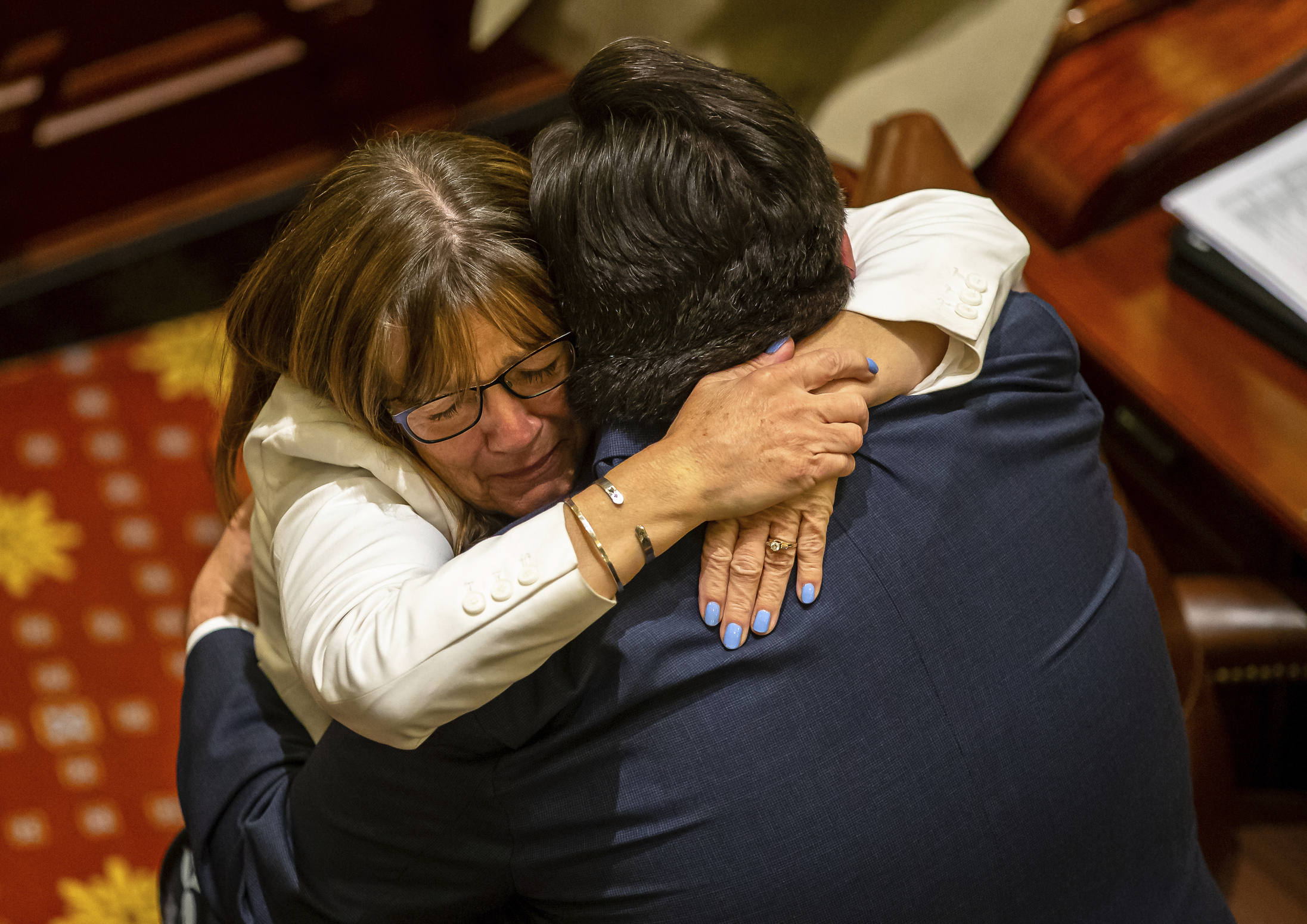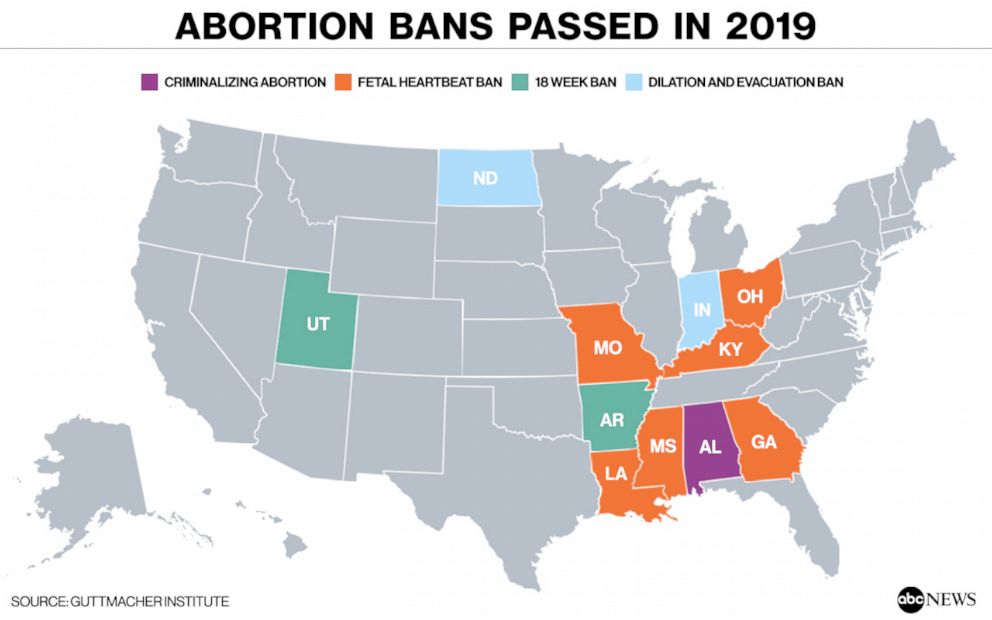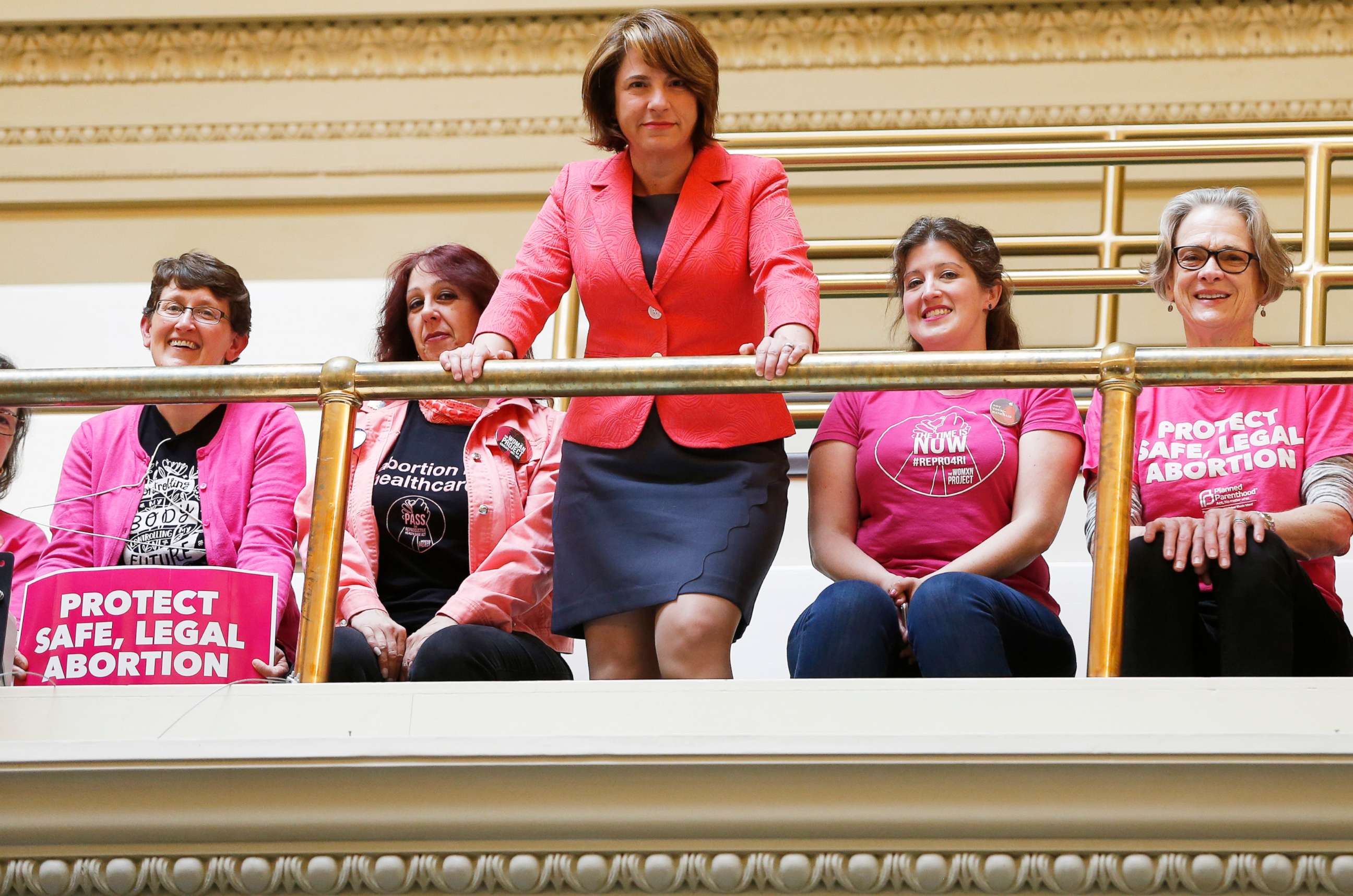Rhode Island joins states increasing abortion rights in 2019
"We're a bastion of sanity and understanding of reproductive rights."
The abortion debate in America has been dominated by news that conservative lawmakers in 11 states, including Alabama, Georgia and Missouri, have approved sweeping new abortion bans, which are being legally challenged from going into effect.
But other states have moved in the opposite direction -- and Rhode Island is the latest to do so.
On Wednesday, Rhode Island Gov. Gina M. Raimondo, a Democrat, signed the Reproductive Privacy Act, which prevents the government from restricting "an individual person from preventing, commencing, continuing, or terminating that individual's pregnancy prior to fetal viability."
It also protects the right to contraception and prevents the government from restricting a person from having an abortion "after fetal viability when necessary to preserve the health or life of that individual."
The legislation was almost completely stopped in mid-May, when state Sen. Stephen Archambault, a Democrat, voted down an initial version of the bill in committee. He told ABC News although he is "pro-choice," he "wasn't comfortable" with the bill's language on abortion in the later periods of a pregnancy and had "serious concerns in the event that there is a post-viability, late-term abortion."
Lawmakers, including Archambault, then worked on revising the bill, leading to this state House bill, which was the one that ultimately passed and was signed.
As legislative sessions come to a close with the start of summer, Rhode Island is far from the only state to have signed a bill encoding the right to abortion.
On June 12, Illinois Gov. J.B. Pritzker, a Democrat, signed the Reproductive Health Act, which establishes reproductive health, including abortion, as a fundamental right in the state.
"The Reproductive Health Act ensures that women’s rights in Illinois do not hinge on the fate of Roe v. Wade or the whims of an increasingly conservative Supreme Court," he said in a statement posted to Twitter. "In this state, women will always have the right to reproductive health care."
The Reproductive Health Act had stalled since its introduction in February, and in mid-May, its sponsor, state Rep. Kelly Cassidy, a Democrat, held a protest to call for movement on the act. She told ABC News at the time that it was "particularly frustrating" to see inaction while other states were passing restrictive laws.
The state Senate went on to sign the bill in late May.

Cassidy told ABC News she supports the bill not just to preserve abortion access for the people her state, but because "this does go beyond the people of Illinois."
In 2017, more than 5,500 women came to Illinois to get abortions from out of state, the Chicago Tribune reported.
Meanwhile, on Monday, Vermont's Republican governor signed a law declaring abortion a "fundamental right."
The bill, which Governor Phil Scott signed, also protects the right to contraception, sterilization and family planning. The state's House gave final approval to the bill on May 14, and there was some uncertainty about how the governor would act.
"This legislation affirms what is already allowable in Vermont – protecting reproductive rights and ensuring those decisions remain between a woman and her health care provider," Scott said in a statement. "I know this issue can be polarizing, so I appreciate the respectful tone and civility from all sides throughout this discussion."
Vermont is also considering Proposal 5, which would amend the state's constitution to declare abortion a right. That proposal, sponsored by state Sen. Virginia Lyons, passed in the state House and Senate, but must be approved again by a majority in both houses in the next legislative session before it can go before voters in a referendum. Its proponents hope to see it on the ballot in 2022.
"Thank God for Vermont," Lyons told ABC News in mid-May. "We're a bastion of sanity and understanding of reproductive rights and process."

On May 31, Nevada Gov. Steve Sisolak, a Democrat, signed a measure that removed some barriers to access to abortion in the state, including a requirement that a doctor tell patients about possible "emotional implications" of abortions and ascertain a patient's age and marital status before a procedure. It also decriminalizes supplying pills that induce abortion without the advice of a doctor.
Sisolak, who also signed a bill allocating $6 million for statewide family planning grants, said in a tweet at the time that Nevada "will NOT go backwards when it comes to reproductive rights and health."
Other states, though, have stumbled in their attempts to enact laws protecting abortion rights.
Maryland House of Delegates Speaker Michael Busch withdrew a measure that would make abortion rights part of the state's constitution in February, saying he recognized it would not pass in both chambers of the State House and that he plans to reintroduce it in 2020, according to The Baltimore Sun.
Meanwhile, efforts to widen abortion access in Virginia led to a showdown between Gov. Ralph Northam and President Donald Trump. Since then, Trump has used increasingly violent and misleading language around "late-term abortions."

Conversations around "late-term abortion" were prompted in part by a long-awaited victory for abortion rights advocates in New York, where Gov. Andrew Cuomo signed the Reproductive Health Act in January. That act codifies abortion as a right in the state and legalized abortion in New York after 24 weeks of pregnancy if the patient's health or life is at risk or if the fetus is not viable.
State Sen. Liz Krueger, a sponsor of the New York bill, told ABC News it has been "extremely disturbing" to see the recent anti-abortion laws pass and be signed in other states.
"I am fairly mortified that state after state, it is older men who are trying to dictate what kind of health care doctors can perform in their state and what kind of health care rights women of fertility age can access," she said. "Who are these men who think they have the right to determine what every women are choosing for themselves in coordination with their doctors? How dare these men tell doctors we will throw you in jail for providing basic health care services?"
She added that in addition to a lack of apparent understanding of reproductive health some anti-abortion lawmakers have shown, they are also acting against the wishes of the people. While an equal percentage of Americans self-identified as "pro-choice" and "pro-life" in a 2018 Gallup poll, a total of 79% of Americans said they believe abortion should be legal under any or certain circumstances.
"I hope it does backfire on [the anti-abortion lawmakers]," Krueger said, "and I hope more and more states realize following New York's path is in the best interest of their residents."






